By Lucy Komisar
May 13, 2018
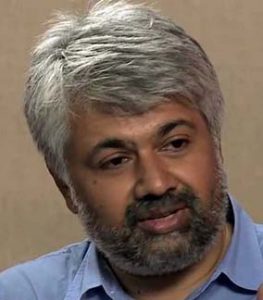
The latest William Browder acolyte in the mainstream press is Tunku Varadarajan, a former Wall Street Journal opinion editor now at the right-wing Hoover Institution at Stanford University. His May 11th WSJ story is a web of fabrications, so let‘s take them one-by-one, with links to the evidence.
I don‘t have the facts of the cited Bitkov case which involves a Russian family that committed fraud to get passports in Guatemala and escape charges of Russian bank embezzlement. Or were they victims of a politically-motivated forced bankruptcy? No proofs, so I won‘t go there. Browder, who says the family was jailed “all because of pressure from the Putin regime” doesn‘t have proofs either, or doesn‘t produce them, but that doesn‘t bother him or Varadarajan.
I love when Varadarajan refers to Browder as “an Anglo-American businessman.” Really, does that mean that one parent was American and the other British? No, it means he repudiated his U.S. birth citizenship in 1998 so he wouldn‘t have to pay taxes on the money he was making in Russia and which he stashed in an offshore network set up by the infamous Mossack Fonseca. But Varadarajan doesn’t say that. This already tells you to be suspicious about what you will read.
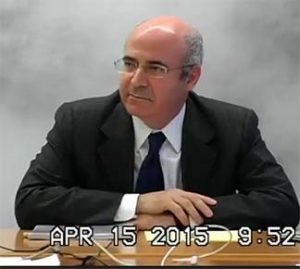
Then Varadarajan talks about the “2009 death in prison of [Browder’s] lawyer, Sergei Magnitsky.” Except that Browder testified under oath in US federal court that Magnitsky didn‘t go to law school or have a law decree. See the excerpted video.
The most infamous lie is that Magnitsky “was beaten to death in his cell by Russian riot police.” The WSJ itself destroys that claim in a report by an NGO, the Public Oversight Commission for Human Rights Observance in Moscow Detention Centers, to which the WSJ links on its own website. No claim of beating, a Browder fabrication that Varadarajan accepts in spite of the contradictory evidence.
More fake “lawyer” claims: “Magnitsky, a Moscow lawyer, worked on a contract for Mr. Browder beginning in October 2007.” Besides that he wasn‘t a lawyer, Magnitsky worked for Browder since 1997 as the accountant assigned to him by the firm Firestone Duncan. See him listed as “auditor” in his pre-October 2007 testimony.
Why lie? To cover up that Magnitsky had been working for Browder for ten years to oversee his tax evasion.
“In the course of his auditing, Magnitsky uncovered a theft from the Russian treasury of past taxes Hermitage had paid, amounting to $230 million.”
Mr. Varadarajan, did you ask for proof that Magnitsky uncovered the theft? (There‘s that pesky evidence problem again.) First indication of the theft was by Rimma Starova, who worked for one of the implicated shell companies and, when she read in the papers authorities were investigating, went to police to give testimony to put herself in the clear. Translation.
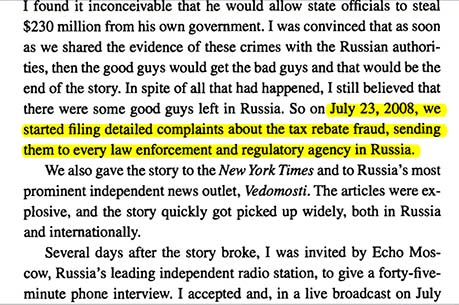
Article: When he refused to back down from his sleuthing, Magnistsky was arrested in November 2008.
What sleuthing? Browder said in his book “Red Notice,” published in 2015, on p. 236, that his group filed official complaints about the tax rebate fraud July 23, 2008. He told the story to the New York Times and Vedomosti that month. Information published in July, Magnitsky still sleuthing in November? Really Mr. Varadarajan?
“Mr. Browder‘s subsequent lobbying prompted Congress to pass the Magnitsky Act of 2012, designed to punish any Russian official who had been involved in the lawyer‘s death.”
That included judges and tax investigators dealing with Browder‘s tax evasion. How were they connected to his death? I‘d implicate the people responsible for his dreadful medical treatment. Which the Oversight Commission discusses. Did judges (unlike in the U.S.) issue a death sentence? When prisoners die from a bad care in U.S. prisons (and they do – check out The Marshall Project), are the judges and investigators responsible?
The WSJ article: When Mr. Browder first went to Russia, in 1995, Boris Yeltsin was president and the country was in a state of amoral chaos. “Twenty-two oligarchs,” he says, “ended up with 40% of the country. Everyone else lived in destitute poverty, with professors driving taxis and art museums selling paintings off the walls.” Mr. Browder acknowledges his own motives weren‘t idealistic. “I went there,” he says, “as a capitalist and an opportunist. There was a huge market opportunity, which was that stocks were trading at this enormous discount.”
Amoral chaos? Well, yes, Browder and his partners bought Avisma from oligarch Mikhail Khodorkovsky, who got it in one of the corrupt auctions. See this. Is receiving stolen property just opportunism?
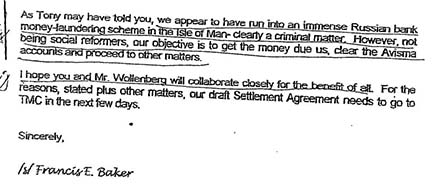
Article: But what was happening in Russia soon began to disturb him. “Long before the Magnitsky story, I saw this looting going on,” he says. “I would see very brazen theft from my own companies.”
Wait a minute. Browder and partners took over Khodorkovsky‘s transfer-pricing scheme for Avisma, which they used to cheat minority shareholders and Russian tax authorities. “Brazen theft?” In that case, Browder was a thief. The documents in a RICO lawsuit in New Jersey proved that. Browder and his corrupt partners settled with the company they cheated. See the story with all the documents.
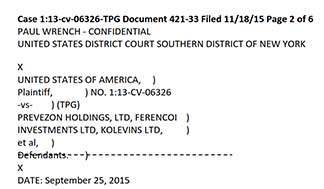
There follows more unproved declarations: that Putin demanded 50% of oligarchs‘ stolen assets and “that Mr. Putin benefited personally from the tax fraud Magnitsky uncovered.” Which we‘ve pointed out he didn‘t uncover. Paul Wrench, working for Browder, filed a complaint about the theft in July 2008. He was asked in a sworn deposition in US federal court who he discussed it with. Answer, Browder partner Ivan Cherkasov, no mention of Magnitsky.
Varadarajan quotes Browder as saying that Russian lawyer Nataliya Veselnitskaya, who represented Prevezon in the U.S. lawsuit, was “well-resourced, with millions of dollars.” No evidence. That she was “a Russian agent.” No evidence.
Actually, Varadarajan refers to Veselnitskaya‘s saying she had provided information to the Russian prosecutor general‘s office. “That makes her an agent.” However, Browder provided the documents based on which U.S. Justice Department filed the Prevezon case. Todd Hyman, the DOJ chief investigator, said that in a sworn deposition. Makes Browder a U.S. agent, right?
Browder notes that Glenn Simpson of Fusion GPS, which worked for the U.S. lawyers defending Prevezon, told reporters that Browder‘s testimony repeating his Magnitsky hoax was “in contempt of Congress and perjuring himself.” Well, Simpson has something there!
Mr. Varadarajan, I don’t know if you have an agenda, or if you were just played for a fool. If you are a serious journalist, check out the documents in this story. And write a correction.
(Note: there was no correction.)

